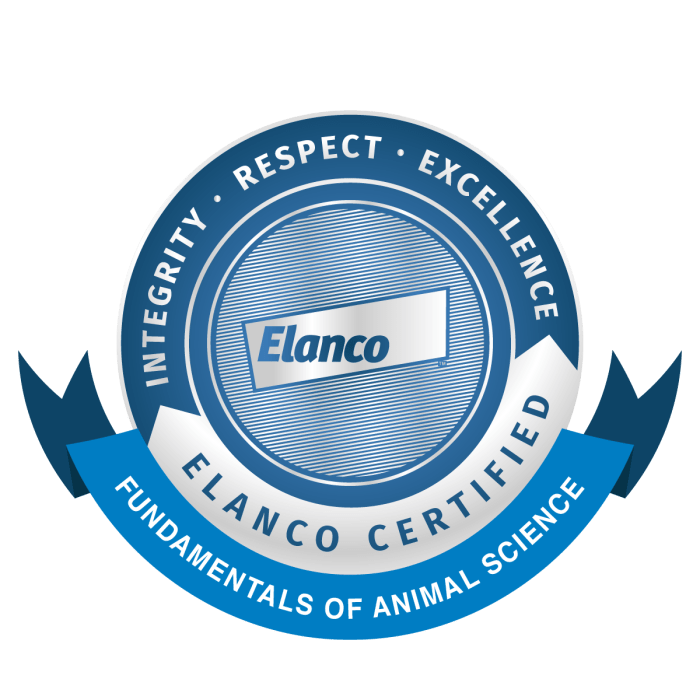Embark on an enlightening journey with the Elanco Fundamentals of Animal Science Certification Review. This comprehensive guide unlocks the intricacies of animal science, empowering you with a solid foundation in this captivating field.
Our meticulously crafted content delves into the core principles of animal anatomy, nutrition, health, production systems, and welfare. Prepare to unravel the secrets of sustainable animal agriculture, addressing pressing environmental, economic, and social challenges.
1. Fundamentals of Animal Science Certification Overview

The Elanco Fundamentals of Animal Science Certification is a comprehensive credential that validates an individual’s knowledge and skills in the field of animal science. It is designed for professionals working in the animal agriculture industry, including veterinarians, animal scientists, producers, and students pursuing a career in this field.
The certification covers a broad range of topics essential for success in animal science, including animal anatomy and physiology, nutrition and feeding management, animal health and disease prevention, animal production systems, and animal welfare and ethics.
Eligibility Requirements and Application Process
- Possess a bachelor’s degree in animal science or a related field from an accredited institution.
- Have at least two years of experience working in the animal agriculture industry.
- Submit an application form and supporting documentation to the Elanco certification board.
Certification Exam Format and Content Areas Covered
The certification exam is a computer-based test that consists of 100 multiple-choice questions. The exam covers the following content areas:
- Animal Anatomy and Physiology (25%)
- Animal Nutrition and Feeding Management (25%)
- Animal Health and Disease Prevention (25%)
- Animal Production Systems (15%)
- Animal Welfare and Ethics (10%)
2. Core Concepts in Animal Science
Animal science is a multidisciplinary field that encompasses the study of animals, their physiology, nutrition, health, and management. The core concepts of animal science provide a foundation for understanding the principles and practices of animal agriculture.
Animal Anatomy and Physiology
Animal anatomy and physiology involve the study of the structure and function of the animal body. This includes understanding the skeletal, muscular, digestive, respiratory, circulatory, endocrine, reproductive, and nervous systems.
Animal Nutrition and Feeding Management
Animal nutrition and feeding management focus on the principles of providing animals with the necessary nutrients to maintain their health, growth, and productivity. This includes understanding the nutritional requirements of different animal species, feed composition, and feeding practices.
Animal Health and Disease Prevention
Animal health and disease prevention involve the study of animal diseases, their causes, diagnosis, treatment, and prevention. This includes understanding the principles of epidemiology, immunology, and veterinary medicine.
3. Animal Production Systems: Elanco Fundamentals Of Animal Science Certification Review

Animal production systems involve the management of animals for the production of food, fiber, and other products. The different types of animal production systems include:
Beef Production
Beef production involves the management of cattle for the production of beef. This includes understanding the principles of beef cattle genetics, nutrition, and health management.
Dairy Production, Elanco fundamentals of animal science certification review
Dairy production involves the management of dairy cattle for the production of milk. This includes understanding the principles of dairy cattle genetics, nutrition, and health management.
Swine Production
Swine production involves the management of pigs for the production of pork. This includes understanding the principles of swine genetics, nutrition, and health management.
Poultry Production
Poultry production involves the management of poultry, including chickens, turkeys, and ducks, for the production of meat and eggs. This includes understanding the principles of poultry genetics, nutrition, and health management.
4. Animal Welfare and Ethics

Animal welfare and ethics involve the study of the ethical and humane treatment of animals in agriculture. This includes understanding the principles of animal sentience, pain management, and environmental enrichment.
Ethical Considerations in Animal Agriculture
Ethical considerations in animal agriculture involve the study of the moral and ethical implications of animal production practices. This includes understanding the principles of animal rights, animal liberation, and the duty of care.
Animal Welfare Regulations and Certification Programs
Animal welfare regulations and certification programs involve the study of the laws and standards that govern the treatment of animals in agriculture. This includes understanding the principles of the Animal Welfare Act, the Humane Slaughter Act, and the American Veterinary Medical Association’s Animal Welfare Program.
5. Sustainable Animal Agriculture

Sustainable animal agriculture involves the study of the principles and practices of animal production that minimize environmental impact and promote animal welfare.
Environmental Challenges
Environmental challenges facing the animal agriculture industry include air and water pollution, greenhouse gas emissions, and land degradation. Sustainable animal agriculture practices aim to mitigate these challenges.
Economic Challenges
Economic challenges facing the animal agriculture industry include the cost of feed, labor, and veterinary care. Sustainable animal agriculture practices aim to reduce these costs while maintaining profitability.
Social Challenges
Social challenges facing the animal agriculture industry include consumer concerns about animal welfare and the environmental impact of animal production. Sustainable animal agriculture practices aim to address these concerns.
Popular Questions
What is the purpose of the Elanco Fundamentals of Animal Science Certification?
The certification demonstrates your proficiency in the foundational principles of animal science, enhancing your credibility and career prospects.
Who is eligible for the certification?
Individuals with a background in animal science or a related field are eligible to apply.
What is the exam format?
The exam consists of multiple-choice questions covering the core concepts Artikeld in the review.